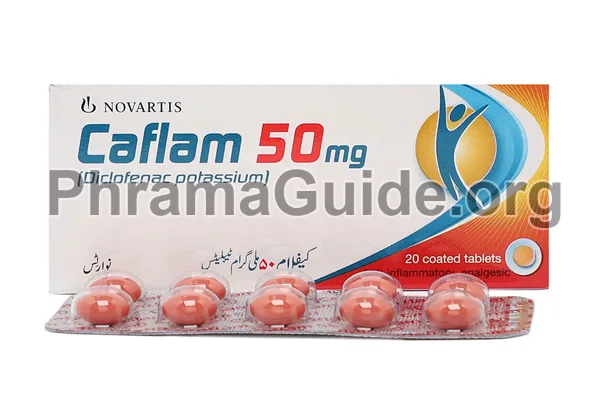Caflam tablet is a nonsteroidal anti-inflammatory drug (NSAID) that is used to reduce pain and inflammation in conditions like arthritis, muscle aches, dental pain, and menstrual cramps. Like all medications, Caflam tablets can have side effects. It’s important to note that not everyone will experience these side effects, and some people may experience them to a greater degree than others. Common Side Effects of Caflam Tablets include:
Gastrointestinal Side Effects:
- Upset stomach
- Nausea
- Heartburn
- Diarrhea
- Abdominal pain or cramps
- Gas or bloating
- Indigestion
Gastrointestinal Ulcers and Bleeding (rare but serious):
- Cflam tablets can increase the risk of gastrointestinal ulcers and bleeding, which can be life-threatening in some cases.
Central Nervous System Side Effects:
- Headache
- Dizziness
- Drowsiness
- Skin Reactions:
- Rash
- Itching
- Increased sensitivity to sunlight (photosensitivity)
Cardiovascular Side Effects (less common):
- Increased blood pressure
- Fluid retention
Serious Allergic Reactions (rare but potentially severe):
- Swelling of the face, lips, tongue, or throat (angioedema)
- Difficulty breathing or wheezing
- Severe skin rash or blistering
- Severe itching
Kidney and Liver Effects (rare but potentially serious):
- Kidney problems, including decreased kidney function
- Liver problems, including liver inflammation or jaundice

What is Caflam?
Caflam is one of the leading brands of Diclofenac Potassium, manufactured and marketed by Novartis Pakistan.
Caflam : Available Formulations and Strengths
Presently, Caflam is available in Tablet form.
Caflam Tablet : 50mg Strength
What Are The Possible Drug Interactions of Caflam?
Caflam, like other medications, can interact with other drugs, potentially affecting their effectiveness or increasing the risk of side effects. It’s crucial to inform your healthcare provider about all the medications, supplements, and herbal products you are taking to avoid potentially harmful interactions.
Here are Some Common Drug Interactions Associated with Caflam:
Anticoagulants (Blood Thinners):
Caflam may increase the risk of bleeding when taken with anticoagulant medications like warfarin or heparin. Regular monitoring of blood clotting parameters is essential if these medications are used together.
Antiplatelet Drugs:
Combining Caflam with antiplatelet drugs like aspirin or clopidogrel can also increase the risk of bleeding.
Other NSAIDs (Nonsteroidal Anti-Inflammatory Drugs):
Using multiple NSAIDs concurrently can increase the risk of gastrointestinal bleeding and other side effects. It is generally advised to avoid combining Caflam with other NSAIDs.
Corticosteroids:
Concurrent use of Caflam with corticosteroids, such as prednisone, may increase the risk of gastrointestinal ulcers and bleeding.
Selective Serotonin Reuptake Inhibitors (SSRIs) and Serotonin-Norepinephrine Reuptake Inhibitors (SNRIs):
Caflam may enhance the risk of bleeding when used with SSRIs or SNRIs, which are commonly prescribed for conditions like depression and anxiety.
ACE Inhibitors and Angiotensin II Receptor Blockers (ARBs):
The combination of Caflam with these blood pressure medications may reduce their effectiveness and increase the risk of kidney problems.
Diuretics (Water Pills):
Diuretics can reduce the effectiveness of Caflam and increase the risk of kidney dysfunction.
Lithium:
Caflam may increase lithium levels in the blood, potentially leading to lithium toxicity.
Methotrexate:
Caflam can increase the blood levels of methotrexate, a medication used to treat certain autoimmune diseases and cancer. This can lead to an increased risk of methotrexate-related side effects.
Cyclosporine and Tacrolimus:
Concomitant use of Caflam with immunosuppressant drugs like cyclosporine or tacrolimus may increase the risk of kidney damage.
Digoxin:
Caflam may increase the levels of digoxin in the blood, potentially leading to digoxin toxicity.
Certain Antihypertensive Medications:
Caflam can reduce the effectiveness of some blood pressure medications, so blood pressure should be closely monitored if these drugs are used together.
Other Medications:
Caflam may interact with several other drugs, including certain antibiotics, antifungal medications, and antiviral drugs. It’s essential to consult your healthcare provider for specific guidance based on your medication regimen.
Related Links:

Leave A Comment